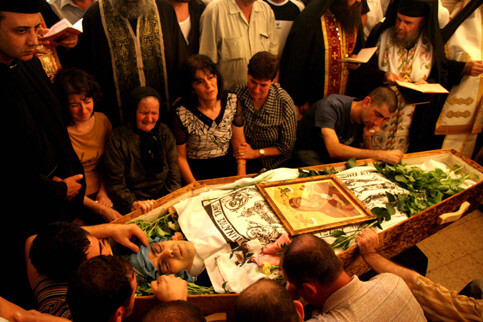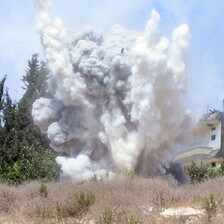Electronic Lebanon 31 July 2006

Relatives of Habib Awad, 46, mourn during his funeral in the Palestinian village of Iblin, northern Israel, 24 July 2006. Awad, a Christian, was one of the two Israelis killed on Sunday when a Katyusha rocket fired by Hezbollah from southern Lebanon hit his workplace in the city of Haifa. (MaanImages/Moti Milrod)
The world has yet again been made witness to Israel’s crimes against humanity. The latest in Israel’s long list of atrocities is a non-stop campaign of destruction, collective punishment and displacement, in a now three week military offensive in Lebanon ostensibly aimed at destroying Hezbollah.
In response to Israeli attacks in Lebanon, Hezbollah has launched daily rocket strikes at Israel. On Wednesday, July 19, a Katyusha rocket struck the Arab city of Nazareth, killing two brothers, Mahmoud and Rabie Talussi, ages 4 and 7. This was not the first time a Palestinian Arab town had been hit by a Katyusha rocket.
Immediately following the deaths, the Israeli daily Ha’aretz initially reported that two ‘Israeli’s’ had been killed, as opposed to two ‘Israeli Arabs’. Referring to Palestinians living within Israel as ‘Israelis’ may not seem out of the ordinary to most people; however, the mainstream has rarely ever done so. The media, state officials, and the average Israeli citizen only refer to Palestinians within Israel as ‘Israeli Arabs’.
The terms ‘Israeli’ and ‘Israeli Arab’ do not mean the same thing. They are used to separate and differentiate Jew from Arab. The ‘real’ citizen as opposed to the unwanted ‘other’ that lives in the country while at the same time is relegated to a state of marginality.
After almost 60 years of being ‘Israeli Arab’ one has to wonder, why now consider Palestinian citizens of Israel ‘Israeli’?
At face value this may appear as an act of solidarity in a time of crisis. It could be an attempt to unite citizens who live within the same borders, despite religion and ethnicity, to bridge the gap between Jew and Arab. Maybe the exclusive character of the Israeli state, the prevailing notion that Israel is a ‘Jewish’ state, rather than a state for all of its citizens, has been abandoned.
By finally including Palestinians in the category of ‘Israeli’, the stage is actually being set for a broader, more strategic form of inclusion - ‘us’ vs. ‘them’. It is us ‘Israeli’s’ against those ‘Arabs’. It is ‘them’ who are the enemy that threaten the safety and security of ‘all Israelis’. It is a cunning way to manipulate the fears of Palestinians, to squash any sympathy for the people in Lebanon and any support for Hezbollah. It is the same old colonial legacy of divide and conquer. Pit the two Arab communities against each other. Make the Palestinians think they are at war with Lebanon as opposed to both the Lebanese and Palestinian people being under assault from the Israeli state.
It is important to note that this fad quickly died, as a more strategic partner to include in the category of ‘us’ was found.
The day after the attack, media coverage quickly changed. As opposed to the emphasis being on ‘Israelis’, the magic word became ‘Christian’ - the two boys that died were at once transformed back into Israeli Arabs. News reports (including those by the Western media) then stressed that Nazareth was a Christian town. Some outlets went to the extent of stating that Hezbollah had ‘deliberately targeted a Christian site’. This was an attempt for Israel to further align itself with the U.S. led war on terror which claims to be defending Western Judaeo-Christian values against Muslim ‘fundamentalists’ who threaten ‘western values and democracy’.
Claims that Nazareth is a Christian town are simply untrue. The population changed dramatically after the Nakba. During the mass ethnic cleansing of Palestine, Nazareth remained untouched by Zionist terrorists who feared that destruction of the town would generate negative backlash from the West because of its important historical Christian heritage. Many Muslim refugees, expelled from neighboring relocated to Nazareth. As a result, Christians are actually a 40 percent minority to a 60 percent Muslim majority and half of its citizens are internally displaced.
Although Palestinians in Nazareth know that they are not the targets of Hezbollah rockets, and that if a rocket hits, it’s a result of lack of precision rather than a deliberate attack, this makes their already subordinate position in the state more complicated.
Palestinians within Israel suffer from a violent form of discrimination that rips at every aspect of life - a form of discrimination that remains largely ignored by the mainstream. Palestinians remain the target of racist policies implemented by the state to confiscate more land and repress them socially and politically in order to cement their status as second class citizens. Israel’s policy of ‘Judaizing the Galilee’, which aims at expanding Jewish settlements in areas with a high concentration of Palestinians and preventing any geographical contiguity between these areas, has had detrimental effects on Nazareth.
Upper Nazareth, also known as Nazareth ‘Illit’, is a Jewish settlement built on top of Nazareth with land confiscated from the already densely populated Arab town - the former is twice the size of the latter with half the population. The Jewish settlement effectively separates Nazareth from neighboring Palestinian villages, which probably would have joined to form one large town. Upper Nazareth serves as a structure that encircles and barricades Nazareth, preventing the town from expanding, despite the fact that the population has dramatically increased since 1948. As a result, Nazareth lacks sufficient space for economic development and residential planning and is extremely overcrowded.
On top of that, Arab towns receive far lower state funding than Jewish towns and almost 50 percent of Palestinians families live below the poverty line.
This underlying structure of racist policies and institutionalized discrimination becomes further exasperated when Arab towns are hit by rockets. To date, several rockets have hit Arab towns in the North. Unlike their Jewish neighbors, the Arab community receives little state protection, even in times of crisis.
In Jewish cities, air raid sirens routinely go off before a rocket attack to alert citizens to take cover, but unfortunately there was no warning siren to notify the Arab residents of Nazareth.
Even if there had been, where would the people go? Most homes in Jewish towns have built in bomb shelters, while homes in Arab towns do not. The people in Arab towns like Nazareth do not have the privilege of fleeing to safety in bomb shelters.
Palestinians lack a sufficient structure of proper state protection. These and other events like October 2000, when 13 Palestinian citizens of Israel were murdered by police officers (who to date, have not been punished), are indicative of the sad reality that the Palestinian Arabs possess a mere semblance of citizenship rights and are unprotected by the state that governs their lives.
As the world continues to watch Israeli atrocities in Lebanon and the occupied territories (West Bank and Gaza) unfold, it is important to keep in mind the violence that the state is committing within its own borders against its Arab citizens, who remain a minority that is unwanted and unprotected.
Related Links
Vivian Tabar is a Palestinian-Canadian born in exile, studying Communications and Anthropology at Concordia University. She is currently in Nazareth, where she is working as a correspondent for the Media Rights Institute.


